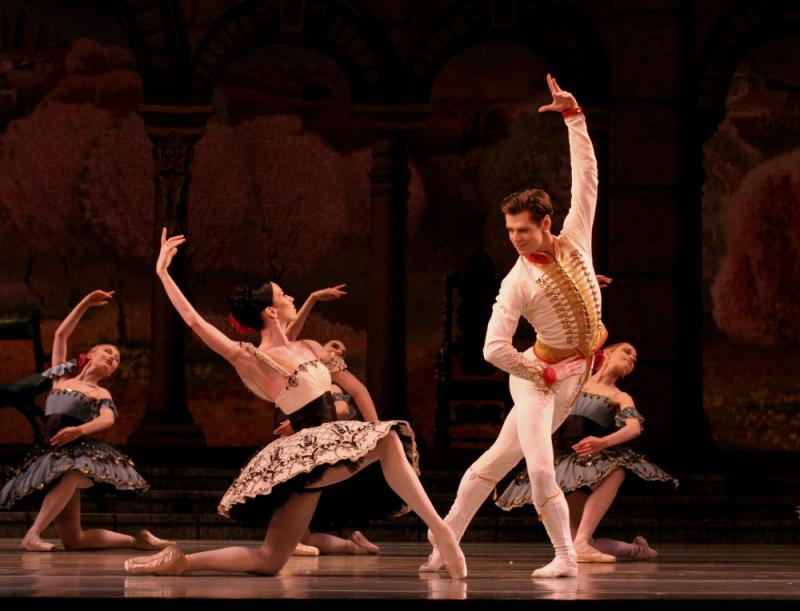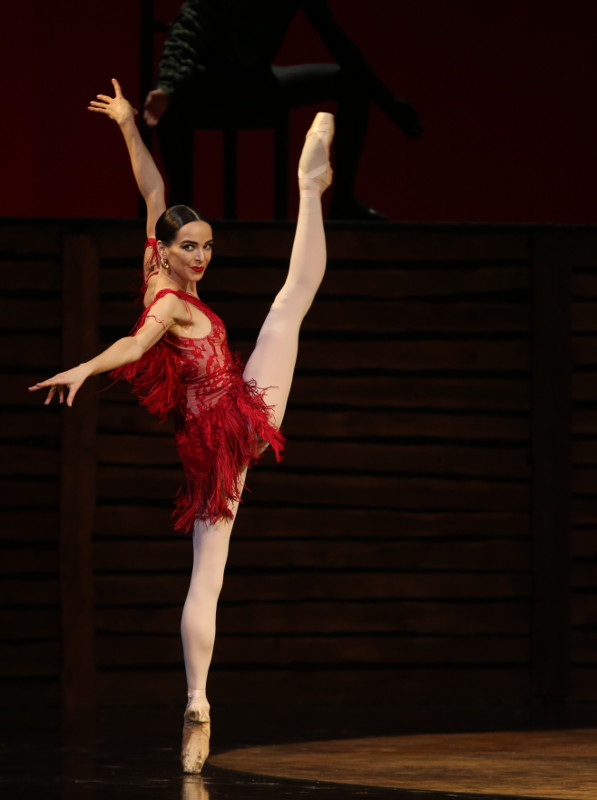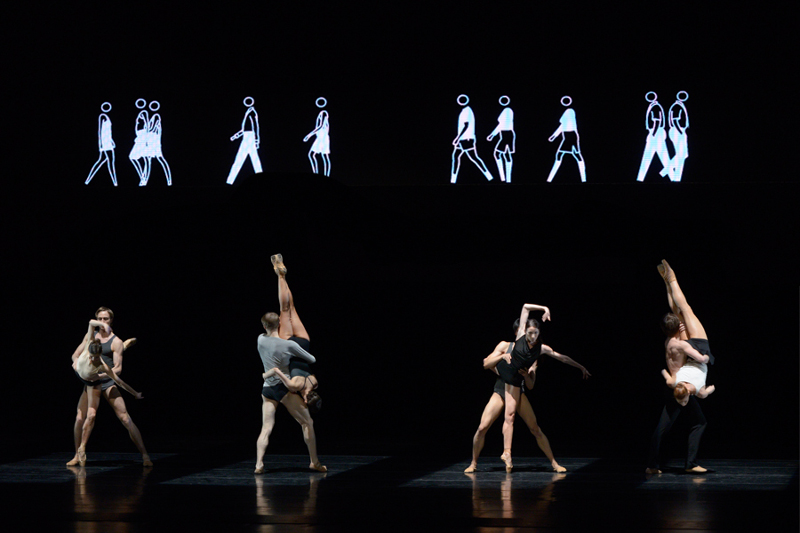Contrasts, Mariinsky Ballet review - company shows off range of its powers | reviews, news & interviews
Contrasts, Mariinsky Ballet review - company shows off range of its powers
Contrasts, Mariinsky Ballet review - company shows off range of its powers
Ekaterina Kondaurova the star as Russians display heritage and contemporary works at Royal Opera House

There are two approaches to a triple bill: make all three pieces similar so you get one crowd with definite tastes, or make them very different so you have a chance of pleasing everyone. The Contrasts bill that the Mariinsky ballet showed at the Royal Opera House was, as its title suggests, firmly in the latter camp.
Carmen was created as a vehicle for Maya Plisetskaya, the great Soviet ballerina who died in 2015, and it needs someone of her magnetism to redeem it from the hokiness of choreography and concept. Diana Vishneva is too affected for the job; of course she can do Alberto Alonso's steps perfectly, with all their then-daring sexiness and pointed subversion of ballet rules, but her Carmen has no redeeming subtlety, and none of the grating harshness that made Plisetskaya's interpretation mesmerising. Vishneva's red fringed dress and the high kicks and bottom-wiggling tell you all you need to know (pictured below: Vishneva as Carmen). Konstantin Zverev is much better, investing Jose with a kind of pained decency that gives the ballet some heart. A smaller part, but I liked slim, precise Alexander Romanchikov as the Corregidor too. Yekaterina Chebykina is an odd choice for Fate: her pretty, feminine dancing style more suited to a tutu part than playing a black-clad bull. Rodion Schedrin's clever redux of Bizet is one of the piece's redeeming qualities, and the Mariinsky orchestra under Alexei Repnikov were obviously enjoying its playful range of effects.

The Grand Pas from Paquita is an extract that stands quite comfortably alone - the original is the kind of 19th-century ballet where knowing the plot won't necessarily make you less confused anyway (see also: Don Quixote, Le Corsaire). A grand pas is the bit at the end where there's lots of show-offery and it all builds to a rousing climax, and the choreography is by Marius Petipa, a master whose grands pas for The Nutcracker and Sleeping Beauty are some of the most purely splendid, spectacular moments in the familiar repertoire. This Paquita, freshly recreated by Yuri Burlaka, is not on the same level as those, due in no small part to its inferior Minkus score, the kind of pirouette-by-numbers stuff that reminds us to be grateful that Tchaikovsky came along to blow it out of the water. But it has its charms: the designs by Andrei Sevbo include a rather sweet period backcloth painted with drifts of blossom, and tutus with tastefully Spanish black lace accents. The dancers evoke blossom too, especially the corps de ballet girls who enter all at once wearing pink and doing a lot of petit allegro jumps, like petals whipping about merrily on a spring breeze. Too merrily, perhaps: their lines were rather messy, not something one expects from the Mariinsky, and a shame when the choreography relies heavily on straight lines and synchronisation for effect. One of the piece's main attractions is the series of variations it offers for soloists to show off (much like the sequence of fairies in the Prologue of Sleeping Beauty). All of them were up to the challenge, but some only just: there was a noticeable change in feeling when Ekaterina Kondaurova appeared again, armoured in the apparently unconscious but totally riveting stage presence that characterises the great principal, to give us all a lesson in timing and expression. Willowy Nadezhda Batoeva was the best of the rest, displaying the promise that has gained her principal roles already. The main role was taken by Viktoria Tereshkina, who brought to it her usual vast competence and command, including a third perfect set of exhibition fouettés to add to those she provided in Don Quixote and Swan Lake in the first week of this tour. Vladimir Shklyarov squired her with aplomb in a role that offers little else for the man to do, apart from one sequence of grands jétés. These he performed beautifully, of course; Shklyarov is never disappointing (though I could have wished he had left off the ridiculous moustache and sideburns from his costume).
One of the piece's main attractions is the series of variations it offers for soloists to show off (much like the sequence of fairies in the Prologue of Sleeping Beauty). All of them were up to the challenge, but some only just: there was a noticeable change in feeling when Ekaterina Kondaurova appeared again, armoured in the apparently unconscious but totally riveting stage presence that characterises the great principal, to give us all a lesson in timing and expression. Willowy Nadezhda Batoeva was the best of the rest, displaying the promise that has gained her principal roles already. The main role was taken by Viktoria Tereshkina, who brought to it her usual vast competence and command, including a third perfect set of exhibition fouettés to add to those she provided in Don Quixote and Swan Lake in the first week of this tour. Vladimir Shklyarov squired her with aplomb in a role that offers little else for the man to do, apart from one sequence of grands jétés. These he performed beautifully, of course; Shklyarov is never disappointing (though I could have wished he had left off the ridiculous moustache and sideburns from his costume).
Contrasts there certainly were, and the company showed off its versatility in tackling them all, but Kondaurova rides off with the prizes for her equally stunning performances in two ballets as different as Infra and Paquita.
- The Mariinsky Ballet are performing at the Royal Opera House until 12 August
- More dance articles on theartsdesk
rating
Share this article
more Dance
 All You Need Is Death review - a future folk horror classic
Irish folkies seek a cursed ancient song in Paul Duane's impressive fiction debut
All You Need Is Death review - a future folk horror classic
Irish folkies seek a cursed ancient song in Paul Duane's impressive fiction debut
 MacMillan Celebrated, Royal Ballet review - out of mothballs, three vintage works to marvel at
Less-known pieces spanning the career of a great choreographer underline his greatness
MacMillan Celebrated, Royal Ballet review - out of mothballs, three vintage works to marvel at
Less-known pieces spanning the career of a great choreographer underline his greatness
 Carmen, English National Ballet review - lots of energy, even violence, but nothing new to say
Johan Inger's take on Carmen tries but fails to make a point about male violence
Carmen, English National Ballet review - lots of energy, even violence, but nothing new to say
Johan Inger's take on Carmen tries but fails to make a point about male violence
 WAKE, National Stadium, Dublin review - a rainbow river of dance, song, and so much else
THISISPOPBABY serves up a joyous tapestry of Ireland contemporary and traditional
WAKE, National Stadium, Dublin review - a rainbow river of dance, song, and so much else
THISISPOPBABY serves up a joyous tapestry of Ireland contemporary and traditional
 Swan Lake, Royal Ballet review - grand, eloquent, superb
Liam Scarlett's fine refashioning returns for a third season, and looks better than ever
Swan Lake, Royal Ballet review - grand, eloquent, superb
Liam Scarlett's fine refashioning returns for a third season, and looks better than ever
 First Person: Ten Years On - Flamenco guitarist Paco Peña pays tribute to his friend, the late, great Paco de Lucía
On the 10th anniversary of his death, memories of the prodigious musician who broadened the reach of flamenco into jazz and beyond
First Person: Ten Years On - Flamenco guitarist Paco Peña pays tribute to his friend, the late, great Paco de Lucía
On the 10th anniversary of his death, memories of the prodigious musician who broadened the reach of flamenco into jazz and beyond
 Dance for Ukraine Gala, London Palladium review - a second rich helping of international dancers
Ivan Putrov's latest gala was a satisfying mix of stars and young hopefuls
Dance for Ukraine Gala, London Palladium review - a second rich helping of international dancers
Ivan Putrov's latest gala was a satisfying mix of stars and young hopefuls
 Nelken: A Piece by Pina Bausch, Sadler's Wells review - welcome return for an indelible classic
A new generation of gifted performers for us to get to know
Nelken: A Piece by Pina Bausch, Sadler's Wells review - welcome return for an indelible classic
A new generation of gifted performers for us to get to know
 Dark With Excessive Bright, Royal Ballet review - a close encounter with dancers stripped bare
The Royal's Festival of New Choreography launches with an unforgettable walk in the dark
Dark With Excessive Bright, Royal Ballet review - a close encounter with dancers stripped bare
The Royal's Festival of New Choreography launches with an unforgettable walk in the dark
 La Strada, Sadler's Wells review - a long and bumpy road
Even the exceptional talents of Alina Cojocaru can't save dance adaptation of Fellini film
La Strada, Sadler's Wells review - a long and bumpy road
Even the exceptional talents of Alina Cojocaru can't save dance adaptation of Fellini film
 First Person: pioneering juggler Sean Gandini reflects on how the spirit of Pina Bausch has infiltrated his work
As Tanztheater Wuppertal Pina Bausch's 'Nelken' comes to Sadler’s Wells, a tribute from across the art forms
First Person: pioneering juggler Sean Gandini reflects on how the spirit of Pina Bausch has infiltrated his work
As Tanztheater Wuppertal Pina Bausch's 'Nelken' comes to Sadler’s Wells, a tribute from across the art forms
 Manon, Royal Ballet review - a glorious half-century revival of a modern classic
Fifty years on, Kenneth MacMillan's crash-and-burn anti-heroine is riding high
Manon, Royal Ballet review - a glorious half-century revival of a modern classic
Fifty years on, Kenneth MacMillan's crash-and-burn anti-heroine is riding high

Add comment